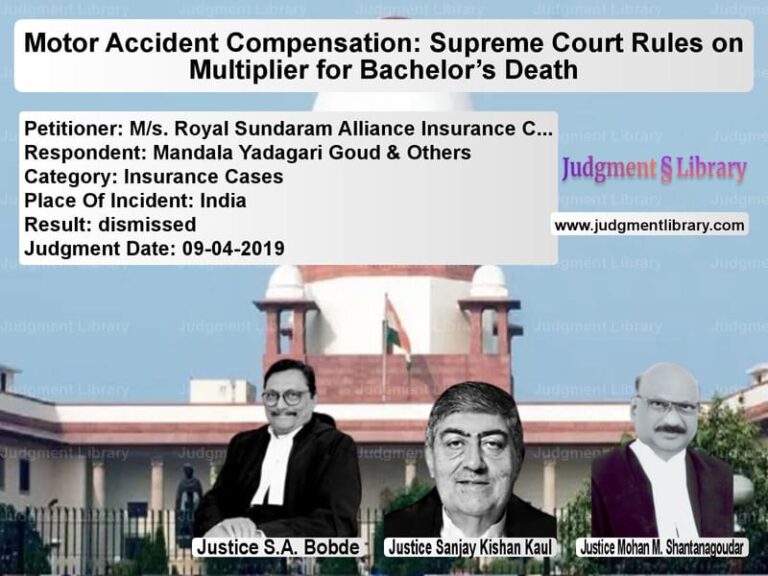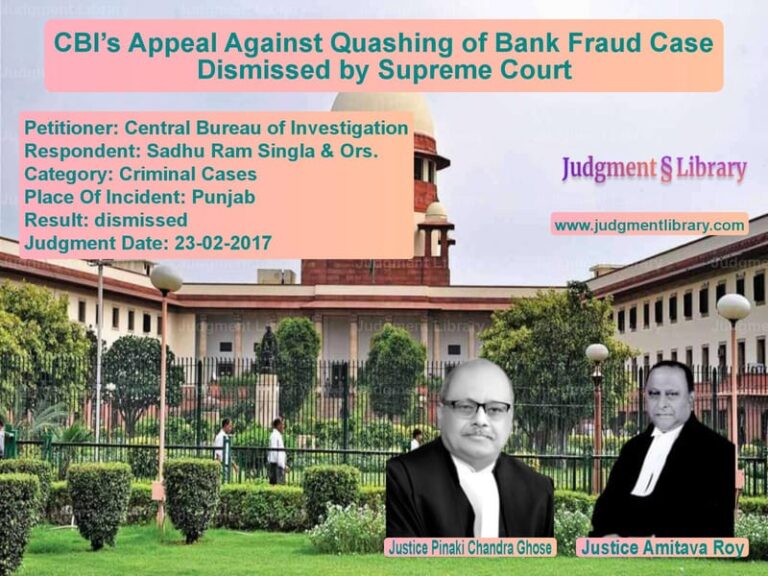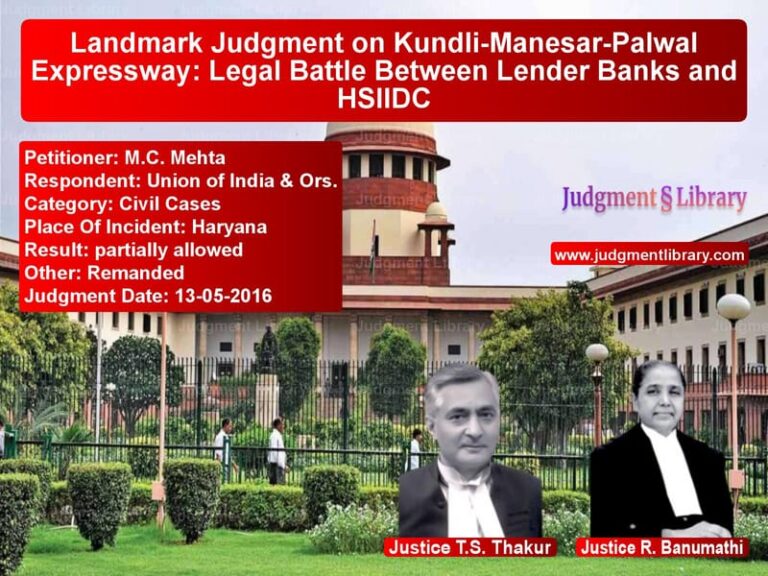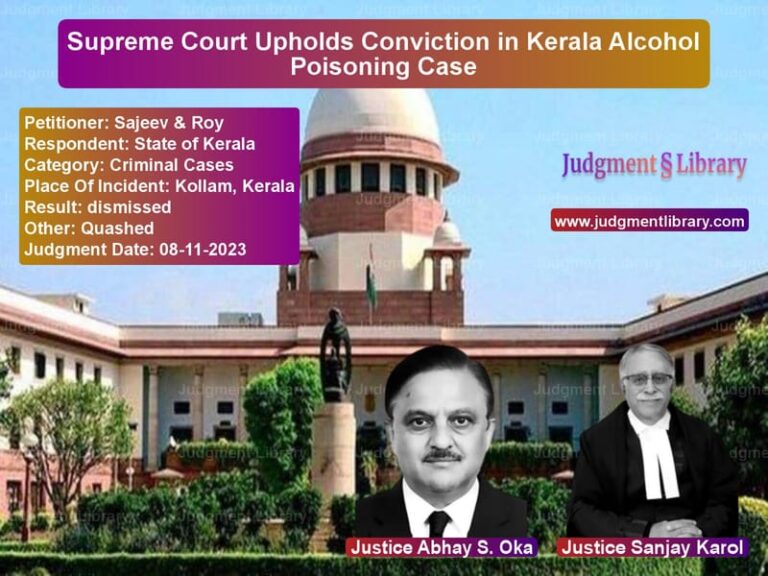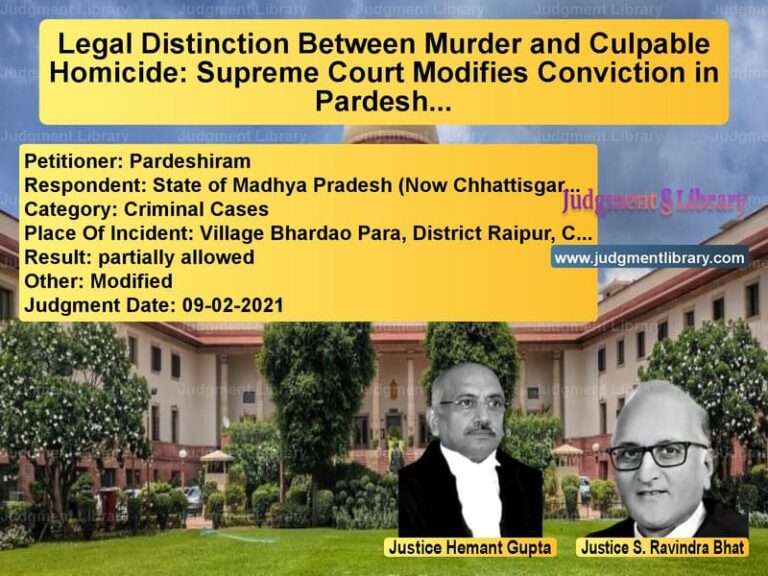Criminal Case Dismissed: Supreme Court Overturns Section 319 CrPC Order
The Supreme Court of India recently ruled on a criminal appeal in the case of Aarif & Others v. The State of Rajasthan & Another, addressing the applicability of Section 319 of the Code of Criminal Procedure, 1973 (CrPC). The case revolved around whether additional accused could be summoned to stand trial based on the evidence of prosecution witnesses.
Background of the Case
The case involved a prosecution for offenses under Sections 148, 341, 323, and 302 read with Section 149 of the Indian Penal Code, 1860 (IPC). The allegations pertained to a fatal assault on the complainant’s father, where the complainant, his father (deceased), and his mother were attacked with iron rods.
Initially, a charge sheet was filed against five accused, but the present appellants (Aarif and others) were not named as accused. However, after the recording of evidence from certain prosecution witnesses, the Trial Court invoked Section 319 of CrPC and issued an order on June 8, 2022, summoning the appellants to be tried alongside the other accused.
The appellants challenged this order by filing a revision petition before the Rajasthan High Court, which was dismissed on April 4, 2023. Consequently, the appellants filed an appeal before the Supreme Court.
Legal Issues Raised
- Whether the evidence provided by prosecution witnesses was sufficient to invoke Section 319 of CrPC.
- Whether the Trial Court followed the due process in summoning additional accused.
- Whether the Rajasthan High Court erred in dismissing the appellants’ revision petition.
Arguments by the Appellants (Aarif & Others)
- The evidence of the prosecution witnesses did not establish a prima facie case against the appellants.
- Section 319 CrPC should only be applied when strong evidence emerges during the trial that establishes involvement in the offense.
- The High Court had earlier set aside a similar order in 2018, requiring the Trial Court to consider the application for Section 319 CrPC only after recording all eyewitness testimonies.
Arguments by the Respondents (State of Rajasthan & Complainant)
- The prosecution witnesses named the appellants as part of the group that attacked the deceased.
- Section 319 CrPC allows the Trial Court to summon any person not named in the charge sheet if evidence suggests their involvement.
- The High Court’s earlier order had given the Trial Court liberty to reconsider the application after recording the remaining eyewitness testimonies.
Supreme Court’s Observations
The Supreme Court carefully analyzed the evidence and legal framework regarding the application of Section 319 CrPC. The Court referred to the Constitution Bench judgment in Hardeep Singh v. State of Punjab (2014), which laid down the standard for invoking Section 319 CrPC:
“At the time of taking cognizance, the court has to see whether a prima facie case is made out to proceed against the accused. Under Section 319 CrPC, though the test of prima facie case is the same, the degree of satisfaction required is much stricter.”
The Court observed the following key points:
- The earlier High Court order in 2018 had already set aside a similar Section 319 order, directing the Trial Court to wait until all eyewitness testimonies were recorded.
- Prosecution witness PW-1 (Manja) had an opportunity to report the alleged involvement of the appellants at the hospital but did not do so.
- Prosecution witness PW-5 (Shahrookh) admitted that he had not seen the incident with his own eyes.
- Prosecution witness PW-7 (Ekaramuddin) gave his statement three weeks after the incident, reducing its credibility.
- Given the inconsistencies in the evidence, the prosecution failed to meet the stricter standard required under Section 319 CrPC.
Final Judgment
The Supreme Court allowed the appeal and set aside the impugned orders dated June 8, 2022, and April 4, 2023. The Court ruled that:
- The evidence of the prosecution witnesses did not meet the required standard for invoking Section 319 CrPC.
- The Trial Court had erred in summoning the appellants based on weak and inconsistent testimony.
- The Rajasthan High Court had wrongly dismissed the revision petition without considering the weaknesses in the evidence.
- The case against the existing accused would continue, but the appellants were discharged from further proceedings.
Implications of the Judgment
The Supreme Court’s decision sets an important precedent regarding Section 319 CrPC:
- Stricter scrutiny for additional accused – Courts must ensure strong evidence exists before summoning new accused.
- Protection against wrongful prosecution – Prevents misuse of Section 319 CrPC against individuals not named in the charge sheet.
- Upholds fairness in trials – Ensures accused are not added arbitrarily based on weak or delayed testimonies.
- Limits reopening of cases – The ruling discourages courts from summoning additional accused without substantial evidence.
The Supreme Court’s decision ensures that criminal trials are conducted fairly, preventing unwarranted additions of accused persons based on weak evidence.
Petitioner Name: Aarif & Others.Respondent Name: The State of Rajasthan & Another.Judgment By: Justice Abhay S. Oka, Justice Pankaj Mithal.Place Of Incident: Rajasthan, India.Judgment Date: 19-10-2023.
Don’t miss out on the full details! Download the complete judgment in PDF format below and gain valuable insights instantly!
Download Judgment: aarif-&-others-vs-the-state-of-rajasth-supreme-court-of-india-judgment-dated-19-10-2023.pdf
Directly Download Judgment: Directly download this Judgment
See all petitions in Attempt to Murder Cases
See all petitions in Custodial Deaths and Police Misconduct
See all petitions in Judgment by Abhay S. Oka
See all petitions in Judgment by Pankaj Mithal
See all petitions in allowed
See all petitions in Quashed
See all petitions in supreme court of India judgments October 2023
See all petitions in 2023 judgments
See all posts in Criminal Cases Category
See all allowed petitions in Criminal Cases Category
See all Dismissed petitions in Criminal Cases Category
See all partially allowed petitions in Criminal Cases Category


